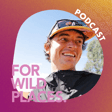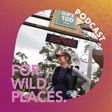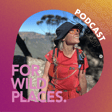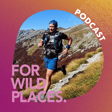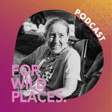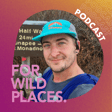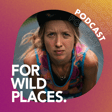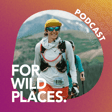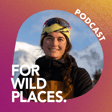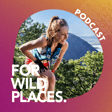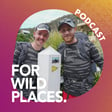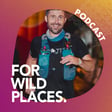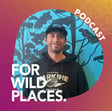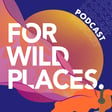Introduction and Podcast Reboot
00:00:02
Speaker
Welcome to the For Wild Places podcast. This is a podcast that shares the stories of inspiring people and their adventures in running, adventure and advocacy. I'm your host, Hilary, and today we are excited to welcome athlete, advocate and disciple of trail culture, Mayelle Backhausen to the podcast.
00:00:18
Speaker
Despite promising during our last episode back in June that the podcast would be back to somewhat regular programming, it's been a while between episodes. As much as we love bringing these conversations to you, our volunteer powered organisation has been very busy with other events, including the Pilliga Ultra.
00:00:36
Speaker
Now that the 2025 Pilliga Ultra is in the rear vision mirror, we're excited to be back in your podcast feed and thanks to our new producer Nico, hope to be bringing you episodes weekly for the next little while.
Acknowledgment of Land and Cultural Insights
00:00:48
Speaker
But before we get into today's Trail Chat with Mayel, I would like to acknowledge the First Nations people who have been custodians of land, waters and culture for tens of thousands of years. Today and every day, we appreciate that the wild places we love to explore on this continent are not in fact wild, untouched lands, but these ecosystems have been cared for by First Nations people for millennia.
00:01:09
Speaker
Here at For Wild Places, we seek to learn from the world's oldest living culture so that we too can play our part in caring for country, as the Indigenous people of this continent have done since time immemorial.
00:01:20
Speaker
This podcast was recorded on Gadigal country in so-called Australia, where sovereignty was never ceded.
Mayelle's Running Journey and Advocacy
00:01:25
Speaker
This always was, and will be, Aboriginal land. Now back to today's guest.
00:01:31
Speaker
Maiel is a familiar face across both Australia and the global running scene, whether it be racing himself, chasing runners with a camera or microphone or both, or simply just exploring the many trails of this beautiful world.
00:01:44
Speaker
Across these two conversations with Maiel, we cover a lot of ground from his early days ultra running on a treadmill in the North Sea to traversing the length of the proposed Great Forest National Park in Victoria's Central Highlands and how Takaina Trail has grown over the years.
00:01:59
Speaker
Our first chat between Will and Myel went down in March 2023, just before the four-part documentary, End to an End, was released. I then caught up with Myel in April this year, hot off the heels of another amazing Tucana trail, during which runners raised over $400,000 to support the Bob Brown Foundation.
00:02:16
Speaker
We chatted about the footprints running camp in Warburton the year prior and what's on the cards for the remainder of 2025. This conversation with Mayel is meandering and meaningful with a focus on the power of community to create positive social change.
Trail Chat and Environmental Advocacy Events
00:02:30
Speaker
Let's get into the chat with Will and Mayel from March 2023.
00:02:35
Speaker
Welcome everybody. Thanks so much for coming to For Wild Places 10th Trail Chat. Bit of a milestone there. My name's Will. My pronouns are he, him.
00:02:45
Speaker
I'm based in Port Kemble, Ochoa, south of Sydney on Darrawal land. Before I go any further, I'd just like to acknowledge the traditional owners of this land and pay our respects to elders past, present and emerging.
00:02:58
Speaker
We are pretty stoked today to have a special guest, someone who I don't think needs much of an intro to For Wild Places' friends, members and supporters. He's a fierce environmental advocate, a kick-ass ultra trail runner and just a generally inspiring person, someone I want to be like when I grow up, although think I'm about 20 years old, I've got some work to do there.
00:03:19
Speaker
Please welcome Myel Backhausen, known as Madge. Thanks, Madge. Hey, mate. How are you? I'm good, thanks. How are you? Yeah, good. Thanks, Sam. Thanks for having me along.
00:03:30
Speaker
ah Pleasure. You're in Sydney now, but you've just been in Tassie. What are you up to down there? It says a lot about my carbon footprint over this week. But yeah, I was just in Tassie on the weekend. We had the fifth Takana Trail down in Takana-Tarkine, northwest of Tassie.
00:03:47
Speaker
where over the past five years we've brought people from the troruning community down into the Tarkin and used it as a way for people to experience it and also to raise funds for the Bob Brown Foundation.
00:03:59
Speaker
ah Continually campaigned to have it listed as World Heritage National Park and returned to Aboriginal ownership. Happy to report that everyone came along and went home safe and sound and also that we've raised now just over three hundred and eighty thousand dollars for the campaign this year massive biggest fundrais of the Bob Brown Foundation's ever had and continues to have and I know Linda's on the call she was down there she said she had a good time it seems like yeah good times all around
00:04:30
Speaker
so fried in a good way after that. That was the weekend. Good times. That is brilliant. I've never done it, but the race is pretty special to for Wild Places. It was, well, you'd know more than me, Madge, but it was pretty much the inspiration to form for Wild Places to try and generate more of this sports activism.
00:04:46
Speaker
It was actually the place where all the founding members met. And when you meet in an environment like that with like-minded people or striving to achieve the same thing, you know, ideas pop up. And for Wild Places, it was one of them.
00:05:02
Speaker
And from that, I guess you could say that other things have been born from it as well, such as the Pillow Go Ultra and also the Great Forest Trail Marathon. um Events with a very similar model ah sports activism, where it is really bringing people to a place that's under threat.
00:05:20
Speaker
allowing them to connect to it and then also using their resources to raise funds for organisations that are really on the front line of protecting those places.
Great Forest National Park Campaign
00:05:32
Speaker
Actually, good segue there because, well, lots of our guests, an hour is just not enough to talk to you long enough, Madge, but one thing people were really keen to hear more about is the campaign down in the Great Forest. So you've recently run two hundred and seventy three k across a spectacular area in victoria If you don't mind, can you give us an idea why you were doing that?
00:05:52
Speaker
Yeah, the actual run took place almost a year ago now. Oh, really? Oh, shit. Yeah, but no know that because that's part of it, right? You do these things. Some people do them and speak about them straight away, which is part of the communication, and that's fine. But for that specific project, it was very much under wraps for a long time because it was part of a communication tool for that area to be able to educate people about it and introduce people to it.
00:06:18
Speaker
And the film, which documents obviously the traverse that I did across the Great Forest, as well as interweaves a lot of scientific first-hand accounts from people on the front lines of protecting that place.
00:06:32
Speaker
It weaves all of that together into a film, a four-part film at the moment. which is available on Patagonia YouTube. I suppose to answer your question, man, the end of the day, i first started working with Patagonia in 2020 and ah first heard about this area in Victoria's Central Highlands that was under threat.
00:06:51
Speaker
It contained the mountain ash trees and the mountain ash tree ecosystem was on the verge of collapse and it still is. And one of their ways for protecting it was designating the whole area there as a national park. And I just saw a map of that park I thought the only thing to do is to run across it. That's just what you do. Why wouldn't you want to do that? And through that, we'll learn so much.
00:07:17
Speaker
We'll experience it in different ways or for myself. as a trailrunner i'll be able to experience it in a different way a way that i love and yeah and born from that was the crossing or the traverse of it and then the film used that as the common thread throughout the four episodes and the documentary really to celebrate those lands and the people that are but of protecting it.
00:07:37
Speaker
Yeah, i was going to do a plug actually for folks watching on YouTube afterwards. We'll make sure we put links in the down below. I've checked out the first three episodes. Beautiful, but also it'll make you angry, but also very inspired. So definitely check that out. And there's some also hilarious bits, Madge bagging out, Bo Miles' beard and some other little episodes. Hey, mate, I was going to ask, do you know, because I've been looking into some national park stuff up here in New South Wales, because i live in this beautiful escarpment and it's quite complex, actually, who owns it, who runs it and that kind of thing.
00:08:08
Speaker
And for several years, there was no national parks declared in Australia. But it seems like now there's a big track that's just been purchased in New South Wales. It seems like it's kind of back on the agenda. Are you able to give us an update on how the campaign's going in terms of declaring the Great Forest National Park?
00:08:24
Speaker
Yeah, so a group of very passionate locals back in the day after the 2009 fires, a group of people came together and were like, okay, how can we protect this area because we don't want to see our backyard get destroyed again like that.
00:08:40
Speaker
Those individuals have been working on this project for nine years now. And at the very beginning, they said that they had to give it 10 years for it to to be somewhat successful. So, they're working in a number of ways, quite complex ways, in some ways confidential, because the system that needs to be influenced to create a national park is quite complex, it's quite legislative, it's very political, and it also has a lot of other people wanting the absolute opposite for those kind of areas.
00:09:11
Speaker
But in saying all of that, it's had a lot of progress over the last nine years and I don't know exactly how close it is. I feel like that is something that not many people know because it's change of governments, change of influences and stuff like that. You can almost change with the wind.
00:09:29
Speaker
But what I would say is that one of the one of the things that we're really pushing with this is that what we need to do is in native forest logics, because if we end native forest logging then it's that whole area is protected.
00:09:43
Speaker
And other areas down in East Gippsland, where a lot of the work that for wild places is looking at working on in the future, which is equally under threat. And so we're in native forest logging in the state, we're going to be able to first and foremost protect the endangered ecosystems and the endangered areas.
00:10:04
Speaker
within within the state. And then from that step, we can then work on designation of a national park and work on those other kind of more intricate solutions to the issue of ecosystems collapse. But but to answer the question, it's kind of, I don't know the answer to that, but there
00:10:25
Speaker
They're still working on it. And they're always positive, like Sarah Rees behind the Great Forest National Park proposal, Steve Meacher, who heads up the Friends of Leadbeater's Possum, and other people, Professor David Lindemeyer, who have been working on this campaign for so long.
00:10:41
Speaker
They're getting incredible traction with cases at court, banning logging companies from certain areas. you look at down of one of the paper mills in Victoria, it's a huge win because it really means that the actual industry of paper and logging for paper products and pulp is reducing in other sectors. It's not just us wanting it to be cancelled. It's actually the people that are using up that material.
00:11:08
Speaker
They're also wanting it to end because they don't see the economic future in it. It's a really common question, though. Everyone's how close is this national park, and it's just not that simple. There's so much complexity to it, and we know that once we say if we did end native forest logging, it has happened in Western Australia, then that would be a point where we could then work from knowing that these areas are protected because they're not going to get
Community Involvement and Logging Debate
00:11:34
Speaker
Yeah, there's a lot to it. There's lot to it. That film is called End to an End, where, again, we'll post links up and stuff. Other than checking that out, Madge, and also we'll share the website, what kinds of things can people do to support that campaign going forward?
00:11:47
Speaker
One of the big things and obvious things is getting out there and experiencing it for yourself and really building your own connection with that place. And then another thing which is probably of equal importance is... there's a number of organisations already out there and they're already doing incredible work on the front lines protecting this area.
00:12:05
Speaker
Friends of Leadbeater's Possum, there's Wildlife of the Central Highlands, otherwise known as Watch, there is Environmental Justice Australia, there's Friends of the Earth Melbourne, there's King Lake Friends of the Forest,
00:12:18
Speaker
There's the Great Forest National Park Proposal, Great Forest Trail Marathon. There's all these organisations that are all doing different but really, really impactful work in that area already.
00:12:29
Speaker
And it's really like, I know, you know, back, like, well, Yvonne Chenault, the creator of Patagonia, has said numerous times, it's up to all of us to step up and use the resources we have to have a positive impact, right?
00:12:43
Speaker
And, you know, we're we're watching this on YouTube and we're probably in a nice place or a nice office and generally we've got a lot of excess resource, be it time, be it our skills, be it money,
00:12:56
Speaker
And we we can surely find a way to partner with some of that and give it to organisations that are out there doing the hard work on the front lines.
00:13:06
Speaker
And so i would say get involved with those organisations. They're all listed on the Patagonia website. under the Great Forest page and they are all doing awesome stuff and it's not boring work. Wilderness, yeah, Wildlife of the Central Highlands, watch. They go out and spotlight at night.
00:13:23
Speaker
They're out there doing epic stuff and you see them in the film in the first episode. They'll go out and they'll just search for threatened species throughout the night and epic stuff and you go out there with good people.
00:13:34
Speaker
It's not boring work and they're getting real results, which is awesome. So... Yeah, highly recommend looking into that. And yeah, it's just such a range of different ways you can get involved. So yeah, I think that's probably the most important.
00:13:47
Speaker
Yeah, awesome. No, I think it's a really important point around not reinventing the wheel and really supporting people already doing amazing things. So yeah, that's, um again, make sure we share those those links and stuff. Thanks heaps.
00:14:00
Speaker
I love that bit in the film. Yeah, the folks that go out and find the endangered species and then they can actually get declared. It's like a 200 metre exclusion zone or something around that bit. Yeah, yeah. Yeah, so, I mean, to explain, they go out there at night because at night that's when animals like Greater Glider, Leadbeater's Possum, which is Victoria's state emblem and it's critically endangered.
00:14:19
Speaker
The next stage of that is extinction. So they're out there and they spotlight, so they go out there with real powerful torches, look through the trees, And if they find one, they've got a GPS mapper, they map where it was found, they record video evidence, they send that information to the Department of Conservation or whatever it is, and then they yeah they put a 200-metre buffer in that area around where the siting is and no logging can happen in that area.
00:14:50
Speaker
So that's awesome because it protects that potential habitat. The only issue with that is that sometimes those animals can travel very far through the night and they can be out of their actual home habitat. So there's a petite piece of forest that's protected, but it's not actually a home.
00:15:05
Speaker
And then, yeah, I think they've protected something like two and and since 2014. One of the stats is in the film. And they've also done, the friends of Leadbeater's Possum have also done work on ah tree species called the tree G-bun.
00:15:22
Speaker
That went to court recently and was one to protect certain tree species, which also protected a whole bunch of other forests. Yeah, really, really reduces the logging industry having access to native forests, which is public land. as well which is also another mind-blowing layer to it all but we were creating this film i don't want to go on tangger on now But when we were creating this film, there's these forest public.
00:15:47
Speaker
They are the catchments for Melbourne's water supply, which is going to be the soon to be the biggest city in Australia. they're also getting logged by a state- ownned company like good funding to do it from the government, like up to 19 120 million dollars a year to keep the industry afloat.
00:16:05
Speaker
All of that mainly goes to either waste product or it goes stuffed pallets or it goes to paper and pulp. It goes to like just plasticity. cardboard and coffee cups and stuff like that. So it's publicly owned forests are getting logged with taxpayers' money and getting turned into coffee cups.
00:16:22
Speaker
The whole thing is just like, what the F? And then the layer on top of that is that it's threatening the water supply to Melbourne, right? And if you log a lot of native forests, it makes it all way more flammable.
00:16:35
Speaker
So you've got this added layer of increased fire risk, which obviously from 2019, 2020,
00:16:42
Speaker
fires we don't want to fucking go there and then 20 2009 black saturday and all of that stuff it's just layers and layers of like oh my god but at the end of the day it's also public forest so you can go out there and run and enjoy yourself and really just kind of connect with the place and i think that's really special because it's absolutely magnificent out there absolutely magnificent the mountain ash the tallest flowering plant in the world and we can go run just right beneath it and just totally froth out on it it's sick Yeah, man, when you put those things together, it's just every single one in isolation is ridiculous, but it's all happening at the same time. It just makes...
00:17:18
Speaker
It makes no sense. And I mean, that's why something like this film is so important because people just don't know that if people get an understanding of what's happening, they are much more likely to get involved and help stop it.
00:17:29
Speaker
What was I going to ask? Oh yeah, on the water, it was mentioned that also after logging, then you've got all the regrowth, which just sucks up so much more water. And another element of ridiculousness in that this is the drinking water for what's going to become become our bigger city. It's just mind blowing.
00:17:43
Speaker
Yeah, it really is. But the real cool thing is that I think it's just been a lot of people just haven't known about it. You know, it's on the doorstep of Melbourne. It's an hour away from the CBD. And I think, I honestly think that as soon as every Melbournian finds out about it, or not even every Melbournian, just like a few of them, and starts to really speak loudly about it, it's just going to topple in a second.
00:18:05
Speaker
People are going to be like, why have we not done this a long time ago? You know what I mean? And so, yeah it's kind of, it's up to everyone just to have small conversations about it. Just start to create awareness about what is actually going on on the doorsteps of Melbourne, even if you don't live there.
00:18:21
Speaker
Because just it just is purely nuts. It's and we can totally do something about it because that that old saying of, you know, don't underestimate the power of a small group of people to change the world because, in fact, that's all that ever has changed the world is small groups of individuals that are dedicated and passionate and they want to change something because they deep down know it's for the better.
Footprints Running Camp and Environmental Education
00:18:42
Speaker
And then they go ahead and they just rally and rally and rally and don't give up and do it. yeah it's happening this is going to take time yeah for sure hey listen we can we can come back to ah this topic in if folks got questions before we move to that though i did just want to ask madge if you could let us know about the footprints running camp which is coming to australia just give us an idea just what what that camp's about how people can get involved if that if that's still a ah possibility but i'm yeah just hoping to get some info on that Footprints is a camp that was created over in America by a good friend and an incredible athlete called Dakota Jones.
00:19:21
Speaker
but Yeah, he created this camp because he too has been a professional runner for a long time and then just realised there's more to this whole game of life or game of being an athlete than just running and trying win.
00:19:33
Speaker
I guess he used his position in the sport to help create awareness about the environment issues that we're facing his camp has kind of developed over the last few years in different ways and um was just very keen to get a similar model over here in Australia because we've just got to continue to make these things available to everyone no matter what country you're in. The Footprints Camp is happening on April 25th
00:20:02
Speaker
which is in the Great Forest, and we're going to be working closely with the grantees, people I listed before, the organisations I listed before who work in that area, and we're going to bring whole bunch of individuals.
00:20:14
Speaker
There's no running skill level or no age limits to it. It's kind of anyone who wants to get involved because they feel they want to get involved. use the knowledge of people that have been before and also the people that are on the front lines there to start to create I guess leaders in that space of environmental protection and also use people's resources and skills like I said before to be able to work together in saving these places or continually protecting these places.
00:20:45
Speaker
And the cool thing about that is that, you know, if you facilitate, like you create an environment or facilitate a healthy space where people can be creative, use their skills, be honest, get educated on certain topics and use all of that in a really good way you just don't know what can come of it you look at something like to kind of trail which was and the idea of two people that came together after watching it the film to kind of and five years later it's raised 1.3 or 1.5 million dollars for an environmental organization and that is a model I'd never seen in a world of trail running and I've been to a lot of countries that do a lot trail running and it's actually not that complex but it's just yeah it's possible so that's really exciting but um if you want to apply it's footprints.org and then you can go to the Australia page have a look at the camp there and we've got some incredible people that are getting involved as mentors to help be that education piece Bo Miles is coming along who's part of the film
00:21:48
Speaker
as well. Kita Ashman, who's a doctor in that space and knows a lot about extinct and threatened species. Yeah, it's going to be pretty sick. And yeah, we look forward. I'm not sure how, because the thing is, is I know for Wild Places is also creating a camp as well. And that's epic because we're all working in the same way to bring solutions to this problem.
00:22:08
Speaker
So it's going to be exciting to be able to share knowledge about what we've learned and how we can continue to come up with the best way to yeah deal with the root problems and the root causes yeah awesome we've got a few people on the call does anyone well i've actually got a bunch more questions for madge but i'm i'm always conscious that i don't want to want to be at about my questions if anyone has some questions for madge just jump in or if you're having trouble jumping in just i think you can you know put your hand up and i'll try and get you in there but um does anyone want to ask madge any questions
00:22:39
Speaker
Yeah, I got one for you, Madge. Tom, how you going? Good, dude. How are you? Doing well, man. Sorry for that announcement. It's all good. Keeping in mind that the logging industry in that particular area is propped up by the government.
00:22:55
Speaker
Did you have any conversations during the making of the film or the research or anything? with people who are arguing for logging native forest and what were some of their arguments for keeping the industry going, keeping in mind like it doesn't make any sense, it's not even profitable.
00:23:12
Speaker
What were some of the arguments from the other side or was it just purely defensive, protecting jobs, that sort of thing? Yeah, you know, a lot of it does come down to that. I think it's probably a lot like the situation with Wild Brumbies up in the Kosciuszko National Park.
00:23:26
Speaker
It's this heritage industry that people feel tied to an identity. That's really hard to take away from people. If there's someone of a family of vloggers and you're saying, well, we're going stop that.
00:23:39
Speaker
Well, you're really threatening who they are as humans and their identity within their community. And so I think that's a big thing because it's real. We don't want to come in and say, have to change who you are tomorrow.
00:23:52
Speaker
Funny enough, Bo Miles lives right on the edge of that part of the world and he comes from a family that has really close ties with the logging industry. We got discussions through him with a lot of the locals and, yeah, it really does come down to a lifestyle and an industry and...
00:24:11
Speaker
taking that away is, wow, we'd all feel the same if anyone said that we have to stop being stop running tomorrow. It just wasn't healthy for the world. That's a big part of it. I think also the the jobs thing is quite big as well.
00:24:24
Speaker
A lot of it falls short in the sense that there so many jobs in that industry, like responsible harvesting of timber if you look at it as that then there's Huge amounts of plantation timber provides all the fibre, the wood pulp and the wood fibre that we need to do what we want to do. It doesn't have to come from native. Critically endangered lead-beaters possum is not living in areas of plantation timber. They're living in old growth.
00:24:48
Speaker
or very old growth native forest. And we're asking for that to be stopped. Production and harvesting of wood fibre, because that can be done in a way that is, I guess, more responsible.
00:24:59
Speaker
And that's a whole other topic. But it's an interesting one, because there's definitely still jobs in that space, just ending an industry that is a native forest logging, as opposed to logging as a whole. So I understand the argument there, but how do we transition? How do we work with transitioning?
00:25:15
Speaker
Because in that too, a number of mills have been asked to be shut down and those mills get given these huge grants from the government to transition into the future. And you just kind of wonder where that funding goes. There's also other conversations with traditional owners about ending native forest logging and some traditional owner groups are like, well, you know what, like if we end native forest logging, does that prevent us from doing selective cultural logging within those areas and depends what the paperwork says but it might be that wood and then traditional owners if they're managing the land but they can't log it as they would traditional management ways then you kind of got a bit of friction there too there's a lot to it there's so much more to it if you designate a national park there's so many caveats to that can you still fish in a national park can you four-wheel drive in national park can you ride motorbikes can you take your dog can you go camp
00:26:07
Speaker
And those are big things too because people want to recreate in those spaces just like we do as trail runners. We want to recreate. But a four-wheel driver can't recreate there. Then we're saying, well, we can because we have less impact, but you can't because you're four-wheel driver.
00:26:20
Speaker
So there's a lot of that too because that's part of people's identity and what they love as a lifestyle if they if they live more in that kind of country. and That's just what they know. Hunting as well is a big one.
00:26:32
Speaker
There's a lot there, but it's very evident that there's pushback against it. And that is a whole whole conversation that is probably happening in many spaces to get it all out, to allow people to be heard and allow conversations to happen.
00:26:46
Speaker
Cool. Thanks for answering. I i fully get the... identity that's tied up with it for the industry but what I don't get with my little knowledge about this is how that is dictating the government's decisions on this because I don't see the logging industry as the cigarette industry or the gun lobbyists in the USA. I don't feel I have that now so for me when I look at this issue I'm just like what how's the government not you know, making the correct decisions.
00:27:14
Speaker
Yeah, and when those kind of issues have been raised or discussed, a lot of things get brought up about the union,
00:27:27
Speaker
to Dan Andrews's Labour government, traditionally very much pro-jobs, pro-supportive on union and stuff like that. And so I think that would be like a big web to look into for sure.
00:27:40
Speaker
But I guess I've always, should like I haven't really given my time to looking deeper and deeper into that. But it does sound like there's a lot of ties to that history within the way that... Unions work with governments and particular governments or particular representatives and governments work with unions and and that involves a lot of industries such as logging. And just goes to say it doesn't necessarily mean you have to have a lot of people to create a lot of noise and have a lot of influence. Sometimes it's just a few people that are super loud and passionate and they will continue to get their way for whatever reasons it is behind the scenes.
00:28:16
Speaker
Yeah, Tom's question made me think there's some parallels with um the area I am. our The history of the Illawarra is really coal mining and and steelmaking, and there's a lot of parallels in terms of talking, communicating with the with coal miners. And, of course, the union are a massive factor and parts of the community trying to create that tension between greenies and jobs, where a lot of a lot of greenies, a lot of environmentalists are actually really interested in in maintaining jobs, whether you call it a just transition or something else, it's really frustrating when that tension is fostered and and pushed and really you try and divide people.
00:28:53
Speaker
yeah Just to follow up on Tom's question, Madge, when you were meeting with those folks, that must have been hard, yeah? Were you just getting written off or was there an openness there to what you were saying? No, I mean, there's certainly discussion that can be had.
00:29:08
Speaker
And I think at the end of the day, everyone's a good human and everyone wants, at the end of the day, wants what they need for their basic living. You know, they want to be able to see a future that's got safety in it so they can provide for their family, live on the land that they've been able to get and just kind of, you know, no one wants to have these epic swings in life because that's quite unsettling. Yeah.
00:29:29
Speaker
Although change is the only constant in life, it doesn't make it any easier to accept sometimes as humans. So, yeah, I mean, there's certainly openness for every conversation. It depends how you approach it and the mood that gets set.
00:29:41
Speaker
And I think you can always have a conversation with someone with a completely different view. if you approach it in the right way and the kind of space is created to do that, if you just go in there and start throwing your own opinions around, you can quickly result in an argument and get nowhere. But, like, you can go in there with a very, very different approach and have a very, very different outcome when it comes to conversation, you know, and that's not limited to discussions about...
00:30:09
Speaker
ending industries and native forest logging and stuff all that like that. So that's continuous throughout.
Mayelle's Personal Journey and Lifestyle Changes
00:30:14
Speaker
Yeah, actually really liked in the film how you and Bo had that chat about looking after the loggers in the sense of it didn't come across as greenies who don't give a shit about it jobs. It actually came across as really thoughtful and that that had been taken seriously into mine so anyway that's another plug for the film sorry i read somewhere madge that you're an engineer and we're working offshore for a while and i was just thinking how the heck did an offshore engineer get into trail running can you let us know how like what got you into the sport i played a lot of like afl footy when i was like going through my teenage years or more so from like 16 onwards and then and i moved to london and then kind of started communicating
00:30:54
Speaker
fire running and that turned into the training for road marathons because a few friends were right into that. And then I ended up doing a trail marathon and I think I just yeah really enjoyed it.
00:31:06
Speaker
Didn't realize it at the time. And that led me to a meeting a lot of other people within that trail running world and ultra running world and just kind of learning about things and sparking curiosity led me into doing, I guess, longer and longer trail events.
00:31:21
Speaker
Yeah. And within all of that, I was yeah working as an engineer in london and got moved up to scotland and started to work offshore and it was some pretty funny moments there just like training on a treadmill and and like if you incline the treadmill too much your head would hit the roof at the gym when you're off offshore living on a barge and then so like some of the treadmills had these holes cut in above them so your head would like stick um just through the roof a little bit and yeah I mean that was some pretty yeah you'd be on out out offshore for like two weeks at a time that'd be some pretty solid training sessions but uh
00:31:55
Speaker
Yeah, and and I guess I would go from one extreme to the other. I'd be offshore for two weeks and then I'd go down to like the French Alps and I'd spend, you know, a few days down in Chamonix and I'd go run in the mountains there and learnt about races like UTMB. And it all just was a huge, you know, pull through my own curiosity, I suppose, and just enjoyment. Like was just fucking con rad, like just getting out there and running long distances and just – That world of running 100 miles was all just like, was never really scary. It was just like, oh, it's 100% something that sounds pretty good to me. So it was just following a bit of curiosity, but also doing something that I've really, really enjoyed
00:32:33
Speaker
and kind of didn't really come up with too many excuses not to pursue that enjoyment and that curiosity, which I think, don't get me wrong, like a lot of people have families, a lot of people have like other responsibilities and commitments. And for me, I didn't have that into a large part. I still don't have that today. So I really do kind of follow that curiosity. and just see where it goes and um yeah i mean there's a million other things that kind of happened within that time and people I met and books that I read that all kind of lead you in down these different paths that didn't really expect. But yeah, it was pretty interesting living offshore in just a kind of like a steel box. It's kind of like you're living in a petrol station, really.
00:33:16
Speaker
Like you could imagine living in a petrol station, right? You rock up and you fill up your car and like you've got the fumes of ah petrol and it's just concrete. It's like kind of greases everywhere. It's just kind of like not a place you'd want to love to live.
00:33:29
Speaker
And there's nothing alive out there. Like nothing is living. I mean, you're in the middle of the ocean, which is the ocean is a huge amount of life, but, everything around you is very dead like the food that you're eating is not very fresh the people that you're with are either like smoking a shitload or they're not like not many people are very active and then you go from that extreme to the extreme of like being out on the trail in the middle of the french alps running and you've got like fresh blueberries around you and like the people are like all saying hello and and um camping and just like it's just like one extreme to the other and
00:34:04
Speaker
I just realised which end of that extreme I kind of enjoyed more. And I've been back and done engineering jobs since to kind of like fund the other side of life. But it's definitely a different world.
00:34:14
Speaker
Actually, and I read an interview with you where um you just said something that really struck me. It was something like um as an adult you went running and you were just you were just reminded of what it felt be kid, just, you know, running through the mud, splashing, getting filthy, dirty.
00:34:28
Speaker
And I just remember thinking at the time, imagine how much better the world would be if we all just got in touch with what we liked as kids. You know what i mean? Like just literally just in touch with nature, not messed up by all the problems. Anyway, I just that comment really resonated with me.
00:34:44
Speaker
It's really, yeah, it's really interesting. I feel like trail running is this gateway back to, yeah, things you enjoyed when you were younger that weren't layered with. Like even now, know, like go outside when it's raining. Like so many people like, oh, I don't want to go outside now because it's raining.
00:34:57
Speaker
It's like it like literally makes you feel alive as a human. Like it literally makes you feel things that you otherwise don't ever feel and that's just like feeling alive.
00:35:08
Speaker
and It's so simple. Like it is so, so simple sometimes. Although there are also extremes. Like, um Tom, I'm looking at you. I remember seeing images of you running around that dam in like almost waist deep in water. And I was, yeah, thinking, whoa, sometimes the elements can get a little bit too much.
00:35:26
Speaker
Yeah. yeah Yeah, I mean, that's when you feel a lot of... Yeah, that's right. Yeah, I mean, like, Tom, like, how do you explain that contrast? of being like so depleted in many ways but then like do you feel alive in that moment or do you is it upon reflection that you feel more alive and then that's what brings you back to those moments yeah I feel that's where I practice feeling alive and then I can apply that in my life outside of running Work stress, relationship stress, all that kind of stuff outside of running. To me, it's kind of a little bit more manufactured because there's so many, you know, layers and stuff to it. but when ah when you're running and you encounter that stuff, it's like the most genuine feeling of feeling alive. And I try and kind of take that and then apply it to my life.
00:36:18
Speaker
If anyone who doesn't know what Tom did last year, last year i get I lose track of years. Anyway, check out Project Run Forever if to to get inspired at an amazing feat that that Tom was part of last year.
00:36:29
Speaker
There's about a million people on this call that could speak to that. I'm looking at it like Paige, Jonathan, you could say something. Belinda, you could say something. You've just run 62K in the Tarkine. That's the furthest you've ever run.
00:36:41
Speaker
Jonathan, I remember seeing you after 50 Great Southern endurance run. Chris, I mean, Chris is just a beast. I think he came, he was out at Bus Run Bus in America, myself and like Ricky Gates and a bunch of crew.
00:36:55
Speaker
And I think Chris was like, dude, how could you not eat meat? And I'm like, dude, eating meat's really bad for the environment. And then like he messages me a month later he's like, oh my God, dude. I haven't eaten meat for like a week. It's crazy.
00:37:07
Speaker
So Madge, I just wanted to say thanks for being a great inspiration. I've been vegetarian now for two and a half years. Oh, wow. So after after that In-N-Out burger extravaganza on bus run bus, I came home and unfortunately lost both my parents to cancer that same year.
00:37:27
Speaker
And, you know, just kind of looked back on our conversations and I was like just so inspired by, you know, how you are and and the things that you do and like the take three for the trail. And I know I got with you and and started a little thing here with trying to get litter off the streets in Tampa, Florida. And now I'm really looking forward to going into my state forests and seeing what kind of a difference I can make there after watching your Patagonia movie.
00:37:53
Speaker
So thanks, dude. Right on, bro. You made it happen as much as I did, man. So big kudos to you. It's so gangster. I love that, man. And there's like- Never felt better. Never felt better. So good.
00:38:05
Speaker
And like, I remember like, and I don't get me wrong. This isn't a conversation about convincing everyone to change who that, like what they do. But like, I remember just the very first year doing something like becoming vegetarian. is is like it can have a really good impact in many ways might not be for everyone and that's totally fine you've got to do what's right for your own health and the way your body works and stuff. But I remember the first year i didn't eat any meat.
00:38:32
Speaker
Afterwards, I was like, man, it's kind of cool. Like not one animal died because I wanted to eat it this year. And I just thought that was rad, like regardless of how I felt because I had some really shit moments. But yeah, I just thought that was pretty rad.
00:38:44
Speaker
Beck's on the call. Beck, she came second at Takaina on the weekend. That was the furthest she'd ever run as well as Belinda. Like I'm sure she just went through a vision quest, which is something else.
00:38:56
Speaker
And Jane's there. I think looking for you now. Oh, yeah. Rad. Yeah. um So I only started running about a year ago when I heard about Takina, when I heard about that trail run. So I started running then. I hadn't run for 20 years before that.
00:39:10
Speaker
So I guess the question would be, how do you how would you recommend for someone like me who's quite a new runner to build up conditioning to be handle trails like that? Well, what's the best way to do that?
00:39:20
Speaker
in short the golden rule is remain healthy and uninjured so it's like really take care of yourself like you never push yourself like in training 100 because it's just the risk of injury and and becoming unhealthy is very very large if you do that so remain healthy and uninjured so take care of your nutrition take care your sleep take care of your hydration like super important because running will always break you down and then it's in your recovery and it's in your rest where you actually grow stronger and benefit from all the stress you put on your body that you get through running.
00:39:54
Speaker
So that's one. And then it's just consistency over time, like continually consistent training, you know? So instead of running once 20K a week, it's better to break that down and do like four, five k runs.
00:40:09
Speaker
And that's just an example of how consistency will work better. And it's just like, it just takes time like it takes so it takes weeks and months and and even years to just to build your body into that space where it can see stress from running as ah as a healthier stress than a threatening stress on your body you know ligaments muscles joints like they're all gonna take time to respond to running because it's quite a high impact, it can be quite full on.
00:40:40
Speaker
So you just need to really balance that and really kind of take care of yourself within that space because it's very easy to get too carried away and just want to run and get into that concept of Well, if I've run fifty k a week and I've been able to achieve this, surely if I run 100K week, I'll be able to achieve so much more. But it doesn't always work like that. it's That's like a very bad trap to fall into. It's like understanding how you can stress stress your body recover adapt grow and then stress again rest recover if you look at it in that space and more like holistically then there's a greater chance that you'll have a longer and healthier existence within the space of trail running so yeah and it's like easy on yourself you know some days you just don't feel like
00:41:32
Speaker
running as much or running as hard or, you know, and you just need an easy day. And there's just like nothing stopping you from backing it off a bit and just taking care of yourself because it comes back to that golden rule.
00:41:44
Speaker
You're not doing any training if you're injured or if you're unhealthy. Like if your hormonal system's whacked out or anything like that, like it's it's really kind of detrimental for your whole life, not just your running life.
00:41:57
Speaker
So, yeah, consistency, enjoy it. remain healthy and then just like have patience with it. Like you've got to be patient to just like understand that one of the best, kind of analogies is um you know like old phone books or white pages or yellow page phone books, right?
00:42:13
Speaker
They're like indestructible. They're like thick. They're so, so indestructible. Like you couldn't tear it anything like that. But if you look at them, they're made up of the thinnest pages, right?
00:42:24
Speaker
And your life as a runner, you can become bulletproof like a yellow pages, but it's just one one day at a time. Like every little bit of training you do is just one thin page.
Trail Running Events and Advocacy
00:42:35
Speaker
So like not one page makes or breaks the book, but consistently over time if you layer it on, it will get you'll just build yourself in to be more bulletproof as a runner, just like a Yellow Pages book.
00:42:48
Speaker
There you go. Yeah. Cool. Thank you. I swear. I was just thinking about my nephews about how I'm not sure I'd be able to tell that story because we're fast approaching a time where people won't know what those books are.
00:42:59
Speaker
Yeah, know, right? Yeah. It doesn't work for an iPhone, I don't think. exactly
00:43:06
Speaker
Any other questions for Madge or does anyone want to speak on recent epic experiences? bit of A bit of a plug. um Warburton is a town that's, I suppose, at the base of the proposed Great Forest National Park and it's an amazing spot. If people ever come to Victoria, if you're not familiar and you want to go and check it out, there's an event there next weekend called the Warby Trial Fest and Hillary and Liz from Full Wild Places are launching the attraction event program there.
00:43:36
Speaker
So if anyone's in the area, it's a great spot to get to and had the the good fortune to spend some time in in that sort of national forest area up around Mount Borba that as well. it's just ah It's an awesome spot to get out for a trail run or a hike or take the kids or a mountain bike or or whatever. So it's it's worth protecting. It's fantastic.
00:43:55
Speaker
Yeah, it's a stunning area. You've got the start of the Yarra River there too, so you can go for a run, have a dip in the river. It's a beautiful place. Awesome.
00:44:05
Speaker
Folks, we're getting fairly close to the hour window, but um but before we wind up, I did just want to ask Madge, I know there's the Footprints camp, but um what else you got coming up this year? ah What else? Well, I mean, we're continuing the campaign we have with Patagonia and the and thank you for not shopping here as a big kind of one of our biggest environmental campaigns that's happening at the moment.
00:44:26
Speaker
And then, yeah, for myself, like I'm not exactly sure just yet where that's going to go I think... at the moment i'm looking at low stampede 100k up in Bright and I did get a place in UTMB this year as well so yeah they're kind of like two things that I've definitely got on the radar and yeah it's just kind of like balancing life out leading up to those two things that will yeah hopefully get me to them so yeah it's a bit of a yeah a couple of things just see what happens there yeah like you said working on footprints and um
00:45:00
Speaker
just i guess continuing to like have small actions towards like this whole world, this new world we've got that's like sports activism and just encouraging more and more people to continue to trail run and continue to get be a part of this community, as well as just think about how they can use their resources a little bit to help shape a better future for other people to be able to enjoy what we've been able to enjoy so far.
00:45:25
Speaker
You guys have got a couple of events coming up. I think is Pilliga going ahead again this year or is that info that's not released yet? Yeah, no, no. Pilliga's going ahead in early September. um i think, ah yeah, yeah, Red Joe and everything will be live soon, actually. So, yeah, um keep an eye out for for that. So, yeah, obviously the same place back up in the Pilliga. We're probably thinking about just doing the same route, the same courses. So, yeah, that'll be awesome. And also, yeah, what Shane mentioned, um keep an eye for the traction events down in Victoria. got like five, four or five coming up. But, yeah, we'll make sure we post links in the email.
00:45:58
Speaker
coming out and on the YouTube. And also, if you're not already, check out For Wild Places membership. All income from membership just goes straight into For Wild Places to help us plan and organise our next events and and and and keep the wheel turning. So if you just go to our website, there's a little membership tab where you can find out some more information.
00:46:18
Speaker
But yeah, we might leave it there. Thank you so much, everyone, for tuning in. And especially massive thanks to you, Madge. You really are and inspiration. and um And, yeah, I just really hope we can keep in touch. And to be honest, I'd love to have you back on another chat a bit later on be awesome to do a follow-up just to keep talking because this chat has been awesome.
00:46:36
Speaker
Thank you so much for joining us. Yeah, it's awesome to see, like, such a good, healthy crew of people as well. I'm always, like, quality over quantity. and it's just like
00:46:49
Speaker
legends this group of whatever it's like 11 people like that's all we need to change the world like we could like literally do it we're just going to be really loud about it really considered in in what we say and that's all we need you look at all the incredible movements and we watch this incredible film called the giants a bit of a biography like of bob brown and just it's unreal what people have been able to do within the civil rights movement um within the movement for like um equal equality for for women in in the space of voting and everything that's coming out from that also like
00:47:23
Speaker
equal rights for and the rainbow community and just like so many things that like we look back on now and just think like how could that have been that way and how did a small group of people change the whole world through just like standing up and just saying like enough is enough and yeah i'm sure like you know you don't don't need many and so like this group of people's a it's a fucking great starting point That's awesome. I love, yeah, you're just such a top example of how I love that thing of um we can turn individual movement into into a social movement. I love it.
00:47:59
Speaker
We need to as well. Yeah, yeah.
Takaina Trail Event and Community Engagement
00:48:02
Speaker
All right. Well, yeah, man, i I just feel like staying and chatting and getting another coffee, but but we need to wind up. Thanks, everyone. Thanks, Madge. And everyone, stay in touch and have an awesome day. See you later.
00:48:13
Speaker
Thanks, everyone.
00:48:16
Speaker
And now we're going to jump forward to April 2025 to get an update on how the campaign to create the Great Forest National Park is going and other campaigns that Mayel is involved in.
00:48:28
Speaker
Last time we chatted it was early March 2023 and you just returned from Lutruwita for the Takana Trail. um The 2025 event was just over six weeks ago. how has the event evolved in the years that you've been involved?
00:48:41
Speaker
Yeah, it has evolved rapidly, i suppose, and also like enormously in many ways. ah Yeah, Takaina Trail, as you know from like the early, early days, was a lot different to what it is now.
00:48:55
Speaker
And it's still a really strong part of the Bob Brown Foundation's efforts to create awareness for Takaina and also to raise funds to help protect it in other ways.
00:49:09
Speaker
And yeah, it's just like such an important part of their organization and they've really rallied around it and have built like a really solid team and operation around the whole thing. So it's been really, really cool to see. And, you know, over that time, like people have come in and gone and, you know, we've had a number of different event managers as well.
00:49:32
Speaker
And they've all, come on board and made changes and then left the event in a healthier way than it was beforehand. And so that's also created a lot of progression.
00:49:44
Speaker
This year, again, in 2025, we had 200 runners down there and raised over $400,000. So, um and it's just an amazing atmosphere and little community for that weekend in Waratah.
00:49:58
Speaker
So, Yeah. And I think, I suppose you can measure it. Basically, you can, the best way to measure it, Hilary, would be to go into the pub and the way that people get, everyone gets received at the pub is way better than it was like five years ago.
00:50:13
Speaker
Because in the early days of Jekina, it was a bit further north near the town of Marawa and famously, people might not know, but there was, I guess, blockades by the local loggers in the early years and they went out and tampered with course markings and yet the public sentiment in that area was dead set against the event. How has that changed being in a new location, being based around Waratah? But what do you think the locals see in the event and why are they slowly warming to it?
00:50:42
Speaker
Well, I suppose it's like so many things, right? It all comes down to like building a relationship. And i think with the town of Marawa in the early days, yeah, like a lot of people showed up in their part of the world and wanted to do something that they didn't really support.
00:51:00
Speaker
And ah don't think there was ah moment where they did any kind of consultation or relationship building with that local crew. And maybe if they tried to, the efforts wouldn't have gone anywhere anyway. But In Waratah, where we have the event now, it's part of like bringing a lot of value to the community and to the township.
00:51:24
Speaker
And it's not just the Kaina Trail, but the Bob Brown Foundation does art for Kaina and they also do BioBlitz, where they bring in these communities of artists and then they bring in these communities of scientists and citizen science.
00:51:38
Speaker
And they all get now based out of Warratah as well. And so every time that happens, you know, there's a huge economic impact in the township. pub gets booked out, the local petrol station and the general store gets a lot of business. And yeah, I think it's just ah been a slow grind in getting to know all these people and build that small relationship. And I suppose at the end of the day, you know if you're bringing good value to the town, not just in the way of money, but also just in the way of and good energy and different people, then over time, that's not going to go unnoticed. And
00:52:14
Speaker
There's always people that are not overly stoked, but the majority of people. And like, I think also it's like the important people, you know, like the people who kind of organize and run the men's shed, which is where it's hosted and the owners and the proprietors of the pub.
00:52:30
Speaker
And there's a lot of other kind of local people that are quite important in that community. And we've got a super good relationship to them. And I suppose that they're like an avenue for communication to other people that we don't have direct correspondence with.
00:52:43
Speaker
and It's part of that kind of long relationship building in a new place. Yeah, and I guess they can see the value of it, not only economically, but I can imagine, do they come down and check out the event? And I guess the novelty of a trail or ultra running event often gets a few curious locals wondering what all the fuss is about. Do they come down and check out what's happening at the finish line and and then understand the the positive nature of the event?
00:53:10
Speaker
And it might be to stop something or to fight for something, but the ultimate atmosphere is one of positivity and... really happy people, euphoric people almost.
00:53:21
Speaker
Yeah, yeah, totally. mean, they run into a lot of people on a runner's high. i mean, yeah, it's probably worth noting that the event is a dry event, so there's no like other things going on there. But yeah, absolutely. Like the people that are involved in the men's shed, particularly, they come down and they now are turning up at like 4.30am and getting the coffee machine going for the runners before they get out and do the race. So there's this like there's this whole thing, oh, maybe they don't turn up at 4.30. Maybe they're doing like a 6.30 shift. But anyway, they see it as an opportunity now where they turn up and they get involved and I suppose they have that real kind of face-to-face contact with the runners as well.
00:54:00
Speaker
So that's great and it brings business to the businesses but then it also brings like some financial support to that community that runs the men's shed there. It's like – I mean, the name's outdated. We can all agree on that.
00:54:15
Speaker
But like, it is really a community whole where a lot of, where people gather and they have an opportunity to do like things that really bring them together. I do a lot of woodwork down there and and all sorts of stuff. And so,
00:54:29
Speaker
the funding that they have received over the years to help for us to hire that venue has gone directly into that venue, being able to remain open for the community for the whole rest of the year.
00:54:43
Speaker
And that that's a pretty big thing because, you know, when they got told that they weren't going to get as much funding as they needed by the local council, local government to keep that massive venue safe and operational,
00:54:57
Speaker
we were able to come in and say, well, okay, like, well, we're going to hire this off you. And and then they found ways to keep that ah alive. And, um, Yeah, there's a lot of positives that come out of it. And yeah, it is a really good atmosphere and a good vibe. And runners are generally pretty nice people, especially at Takana because it's like an event that, as you know, with all the other stuff that The Wild Places does, like be it Pillowgar and also being around the Great Forest Trail Marathon, like those events, people come to them and they're not always like bloodthirsty runners that just want to PB and they'll like
00:55:32
Speaker
jump over anyone to get a position better in the
Documentary Impact and Environmental Campaigns
00:55:36
Speaker
race. It's so much more about like the sense of something greater that you're all there to support than your own personal achievements and your own PBs. So brings an awesome atmosphere and a rad crew of people. and And raises a lot of money in the process as well.
00:55:51
Speaker
Yeah, yeah, absolutely. Like, don't get me wrong. There's like, even this year, there was like I wouldn't say altercations, but there was definitely like calls for concern at the pub where some people were like effing greenies and all that stuff. Like still happens. Like there's no doubt about it.
00:56:08
Speaker
But I suppose, you know, the right people are on your side. The owner of the pub will be like, oh, look, know, I'm going to sort him out. know, you guys don't worry about it. Like... But it's still, there is still that sentiment because especially in that part of the world, there's a long way to go to to see the progress that kind of we all hope to see in the Western world, I suppose.
00:56:30
Speaker
Definitely. And moving a bit further north to Victoria and the proposed Great Forest National Park, last time we spoke to you, you were just your film was just being released on Patagonia's YouTube channel, End to an End.
00:56:43
Speaker
And looking back on that, what influence or impact did that documentary have on that campaign? And I guess raising awareness of the need of the Great Forest National Park and yeah, the ecosystems that you experienced along the way.
00:57:00
Speaker
It's like so many of these massive campaigns and these massive efforts to do something different or create some change within ah an important place. I think it it just adds an extra layer.
00:57:12
Speaker
It just adds an an extra piece to the puzzle. And I think when the Victorian government said that they were going end native forest logging, I remember speaking to Sarah Rees, who is One of the people behind the Great Forest National Park initiative and proposal is like, you know, it really is like a death by a thousand cuts.
00:57:34
Speaker
And some people have been working on it for 20 years and more. And some people have only just come into the fold, such as the film and the work that we did with that.
00:57:46
Speaker
And I think like they all just add that little bit more pressure, that little bit more awareness to the piece, that little bit more of a spotlight onto the issue that eventually the people that make decisions can't really turn away from.
00:58:00
Speaker
And I think it's super interesting because I think like at the end of the day, the people that make the decision and speak about it, they don't really confess to the real reasons why things changed.
00:58:11
Speaker
And I think that's probably a part of politics or whatever that is. But yeah, it's just super interesting to know that it was just one small little piece of the puzzle and behind the closed doors of those decision makers, you never really know what but makes the biggest impact sometimes.
00:58:27
Speaker
And that's kind of fine. But again, it just built a lot of relationships in that space and it built a lot of alliances. And it was just really great to work on projects like that and get a greater understanding of how that film could help promote certain movements that otherwise weren't really getting the attention that they felt they needed. There's so much to it. And then, you know, when you take a film like that and you show it to people all the way up the East coast of Australia.
00:58:55
Speaker
and it's just super interesting to see what the feedback is from all those people and what people think can be done differently in their area. Because like, you know, you know how it is. Like you just kind of, you put yourself in these situations a lot of the time and you never know what seeds get planted.
00:59:13
Speaker
You never know what people really take away from those situations and those, those instances. And sometimes, You know, it's like years later where someone will mention something.
00:59:26
Speaker
You're like, oh yeah, that's like, yeah, I suppose like that would have, I mean, that did plant that seed for you. And I suppose I know like you do a lot of work as well where you don't get like direct feedback positive feedback instantly all time.
00:59:42
Speaker
you kind of just got a hit and hope sometimes and just think like, geez, like this feels like the right thing to do. Like this feels like the important thing to do. um And they're still cutting down trees and they're still like sucking gas out of the ground. So it's obviously hasn't stopped that. But I mean, maybe it's having like a positive impact.
01:00:03
Speaker
Yeah, it's an interesting one. I don't know. Yeah, I'd put that question on you. like having like what do you yeah Well, it's very funny actually. I was at a conference two weeks ago and Dan Andrews was there. he was on a panel and there was the opportunity to ask questions.
01:00:19
Speaker
So I submitted a question asking about the end of native forest logging in Victoria and kind of said what – stands out as actions taken by the community that helped made this decision the right thing to do at that time.
01:00:33
Speaker
But I um made a bit of a blunder and put my own opinion in the question and said, which was ultimately, i called it ultimately economic decision. And it was funny because during the conversation, Dan Andrews was very relaxed, very personable, very likable, very self-effacing.
01:00:52
Speaker
And then ah soon as this question was asked, he just Premier Dan Andrews came. he just took on that tone of it wasn't an economic decision. It was because I'd seen these forests out of a helicopter and I knew it was the right thing to do.
01:01:06
Speaker
and in my head, I was just screaming, you complete bullshit. And I was ah like, and it so it was so frustrating because there were people in the room who were from community groups and organizations and non-for-profits and NGOs and all the people that had chipped away those thousand cuts.
01:01:26
Speaker
And rather than acknowledge any of the work that anyone had had done, he just said he'd seen it from a helicopter and knew it was the right thing to do. And if anything, just shows how political politics is.
01:01:39
Speaker
And there's so many things that would have contributed to that. But at the end of the day, some politicians always always take credit for it and think it's their fantastic
Footprints Camp Outcomes and New Projects
01:01:47
Speaker
idea. But eventually the tide will turn, the social license will erode and they'll do the right thing, but they won't necessarily give credit where credit's due. But I think that everyone within the movement knows and hopefully appreciates the part that I all played individually and collectively to to make that happen. But yeah yeah, it just shows what a convoluted world politics is, even if you're not in it anymore and you're, you
01:02:14
Speaker
But speaking of those. Sounds like Dan had a at another fucking moment where he thought he was actually God flying everything. Yeah, I know. And the fact that he said he saw it out of a helicopter, i was like, could you be less like attuned to the real world?
01:02:29
Speaker
But from anyway. He probably thought the sun that was shining on the trees was also coming out his ass too. anyway Oh, dear. Anyway, at least it's been, well, it hasn't finished. There's still a lot of um nasty stuff going on in our forests.
01:02:43
Speaker
But thankfully, with the work of the Footprints Camp, which was also around the time that we last spoke to, it sounds like it was very busy time back in March 2023. But yeah, how was the first Footprints Camp? And I know that you wanted people to come along with an idea or a project, but that they wanted to bring to life that would support the campaign. What are some of the examples of, yeah, the seeds that were planted during that and that may have come to seed?
01:03:10
Speaker
It was a really incredible few days there. The crew that came along and the kind of little family that was created was really quite surprising and really quite powerful and meaningful in many ways. It was, um yeah, was really, really cool to be a part of that.
01:03:29
Speaker
And yeah, as you said, like a lot of people came along with but different ideas and it's been really great to see the small things that have come out of it. And then also kind of the bigger things that's been incredible.
01:03:41
Speaker
And I think one, again, like to come back to the relationships and stuff like that, like a lot of relationships have been created in that space and they are very, very strong now. And have probably led to things that were never discussed at the camp and things that have been supported since then. So that's been awesome. But um like the there was the Great Forest Guidebook is something that has just recently been released.
01:04:07
Speaker
I mean, that has a huge amount of content in it to help support recreation and visitation and the kind of exploration that you can do in that part of the world. It's got like so much, so much information around that. It really is like a very comprehensive guidebook for building things you know, years worth of weekends out in that part of the world.
01:04:31
Speaker
So that's something that's, yeah, like I said, just recently come out. One of our good friends from camp, Amy, she created the Barking Mad Ultra, which is a race that she does very close to that Great Forest, proposed Great Forest National Park.
01:04:47
Speaker
And that is like getting a whole bunch of people running a race with their dog. And actually the proceeds of that really go to a dog rescue organization that she is a part of and that she kind of owns essentially.
01:05:02
Speaker
And so like, you know, the funds that get raised at this event don't necessarily go to the creation of the Great Forest National Park, but They go to another really worthy cause that's very special to her and they get to really experience that beauty that is that part of the world.
01:05:17
Speaker
So that's cool. So yeah, Barking Mount Ultra is certainly something to get involved in if you've got a dog and you like running with it. A good friend, Liam, he was at the camp and he really worked a lot on creating the Great Forest Way, which is like a bikepacking route that we got to cycle back in November last year, which is awesome. It's like two hundred seventy eight k something around that and yeah, could be done in like one go. I think someone's done it in 18 19 hours and then We did it over like three days and yeah, it was really cool. It was one weekend in November. I think might have been the the long weekend in early November where, yeah, was just like rocked up at Lilydale Station and it was just like no idea. And I think, you know, there was ah solid crew of people.
01:06:04
Speaker
I'd say maybe like 40 people on their bikes all rocked up and then just that was it. And we just like cycled along this route um for the next few days camping and hanging out. So just another way to kind of create awareness. And some of the people at the camp as well, they work for a um ah pretty incredible company called Pollination.
01:06:26
Speaker
And so they really did a lot of, I guess, what you'd say, consultancy work around the economics and the future of the forest and That was quite a complex and comprehensive report that really dove into like alternatives to native forest logging and also financing that part of the industry and transition out of that industry and also like the reasons why it doesn't make sense.
01:06:54
Speaker
And yeah, and but they came together to to build a report that was actually more so used as a tool to speak with other organizations in other parts of Australia as well about native forest logging and its issues and opportunities as
Economic and Environmental Advocacy Efforts
01:07:13
Speaker
So that was quite a big thing that came out of it. And obviously like we didn't really see what that, that the result of that was because it's like a private business kind of entity that is, that kind of uses that information. But, um,
01:07:28
Speaker
Yeah, it was really it was really cool to see that all come together. and And, yeah, so it's kind of wild to, yeah to be a part of that. It's kind of like something like Takana Trail or, you know, any kind of event where you get a lot of people together and and hang out and are very like-minded and and want to see a bit of change in the world and and have a little bit of confidence that something might be able to happen.
01:07:54
Speaker
Yeah. There's probably a lot of things that can't be measured that comes out of the camp like that as well. And a lot of things that probably it's led to that maybe you wouldn't really know, like didn't really know that that camp was like the starting blocks for for something that's eventuated.
01:08:09
Speaker
Yeah, you know, like we did Footprints and then, um you know, that was in kind of collaboration with Footprints, the organization that was in the US. and And yeah, there was a lot of things that happened at a US version of the camp that led to us not really being able to do that camp again, which was a bit unfortunate.
01:08:29
Speaker
And so that's not being able to see another light of day, unfortunately. Yeah, it's disappointing. But i guess you've still got the group of people and the connections and the network that you created that kind of live on long after camp is over. Totally, yeah. And probably sustain everyone and keep everyone connected and motivated and feeling part of something greater than themselves.
01:08:50
Speaker
Yeah, yeah. No, absolutely. And like it's a pretty cool thing to be able to be a part of and one of those things that's just like you feel really grateful for in many ways. Yeah. We'll wrap it up shortly, but before we do, keen to know what you've got coming up on the, what's on the horizon for the rest of the year.
01:09:08
Speaker
I just am working more so in freelance at the moment and do a lot of that. So what I've got coming up is just a lot of work in that space, trying to link those parts of life together where, yeah, you know, you're just like trying earn a crust in many regards, but I've got, yeah, a bit of work overseas and also just like figuring out ways to make sure like I still keep very much in touch with the the communities that are in Australia.
01:09:40
Speaker
It's an interesting time, especially with federal election coming up and also like especially with the like the Great Forest National Park proposal in know so in Victoria, it's like it's a really interesting time because it's so important to keep advocating for that national park.
01:09:59
Speaker
um But like a lot of people kind of turn off their hearing when you're like, oh, yeah, because kind of native forest logging has ended. But there's so much nuance within all of that. And it's like, yeah, but it's like super, super important to make sure that people know that it's still like super important to advocate for it and you've got to tell people that's what you want.
01:10:17
Speaker
And so it's just like really, really an interesting time in that space. And then with Takaina and Takaina Trail, yeah, again, like, you know, native forest logging is still just so full on in Tasmania.
01:10:32
Speaker
And it's like, it's pretty hectic to see that all unfold when you are like not down there and, you know, and it's like another year away it so you do to do Takaina Trail. So you know It'd be amazing to use the energy and the motivation that's behind things like the Tarkin and also Great Forest up in Victoria and just like still figure out ways to provide avenues for people to get involved via events and maybe have a little bit more impact as individuals and stuff like that.
01:11:01
Speaker
So, yeah, it's just like it's kind of thinking a little bit more about all those things and try to figure all that out. yeah Yeah, the work doesn't end. That's for sure. Yeah, yeah, yeah, absolutely. And I'm pretty sure that dude's name's Harry.
01:11:16
Speaker
You were close. You got there in the end. um Well, we'll let you get back to your evening, but thanks so much
Conclusion and Future Engagements
01:11:22
Speaker
for time, Madge. Good to touch base and close the loop on so many of those projects that were happening two years ago. And even though they're over, they're definitely not over. yes Yeah, yeah, it's definitely not over.
01:11:34
Speaker
But um yeah, thanks a lot. It's cool to do an update. Absolutely. And that's the finish line of our ninth trail chat. Thank you for tuning in into this conversation with Miel Backhausen.
01:11:46
Speaker
If you'd like to see and hear more from Miel, you can follow him online at Miel B, that's M-A-J-E-L-L-B, or on his own podcast, Stokely. If you're keen to be a part of the Turkina Trail Action, registrations for the 2026 event are now open.
01:12:01
Speaker
To find out more, head to www.bobbrown.org.au slash event slash Turkina hyphen trail. If you like what you've heard and would like to stay in touch with For Wild Places, then follow us online at For Wild Places or subscribe to our weekly newsletter.
01:12:18
Speaker
Every Friday, we'll pop into your inbox, bringing you interviews with athletes and activists, events, info and everything trails, environment and adventure. And if you'd like to support what we do, then you can make a tax-deductible donation.
01:12:31
Speaker
To donate, head to forwildplaces.com. Thank you again for joining us. We are stoked to have you here. Thank you to Mayelle for taking the time and to Lara Hamilton for our theme music.
01:12:42
Speaker
and Until next time, happy trails. And as always, thank you for taking the time for Wild Places.

